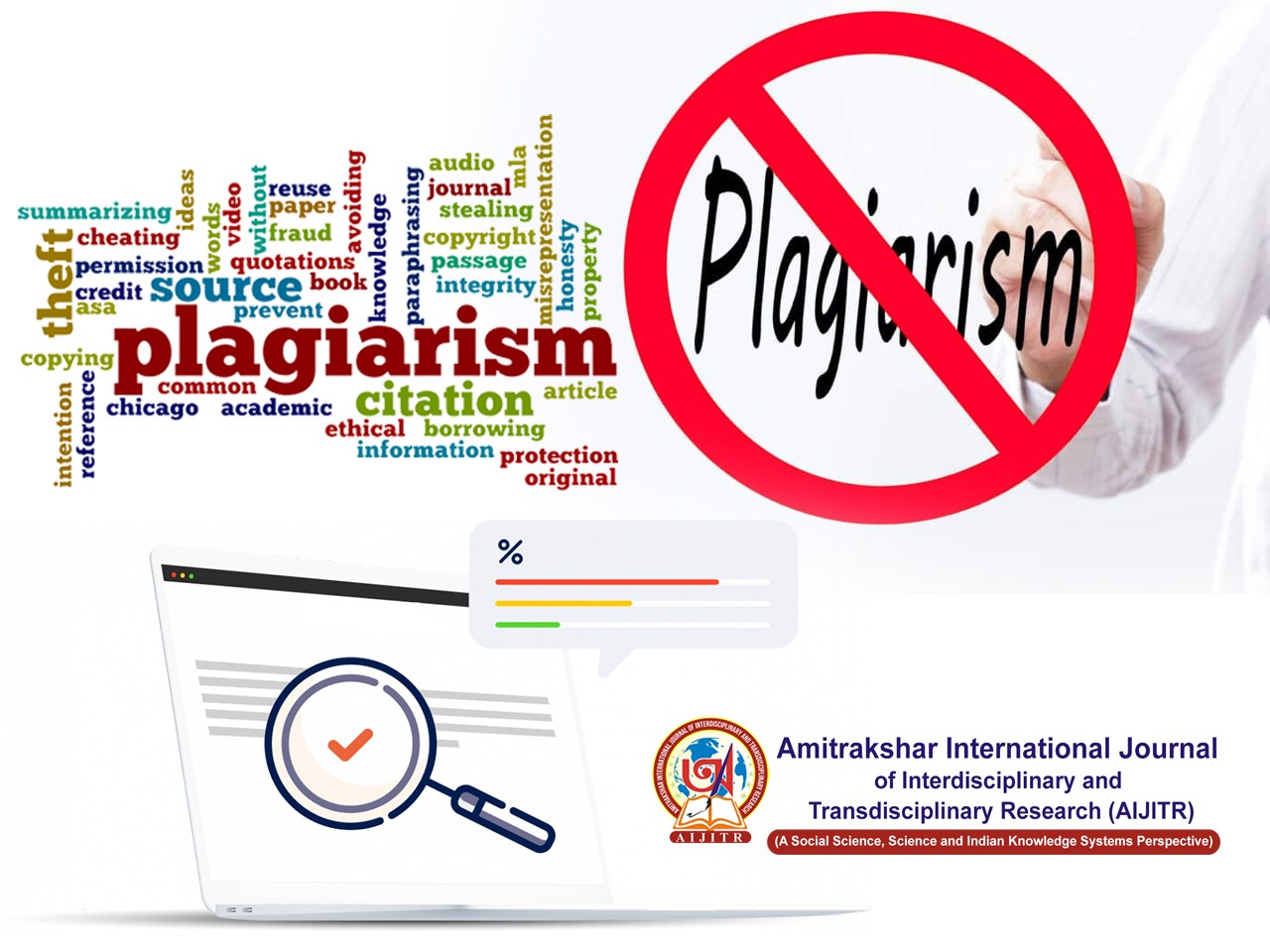

Plagiarism
In academic research and publication, it is crucial to maintain the highest standards of originality and integrity. To preserve the authenticity of intellectual work and to avoid the piracy of intellectual property, the Amitrakshar International Journal of Interdisciplinary and Transdisciplinary Research (AIJITR) has implemented a strict plagiarism checking policy. This policy ensures that the submissions are free from any unauthorized duplication or misuse of previously published material.
AIJITR enforces a plagiarism limit of less than 10%. This means that no submission should contain plagiarized content that exceeds this threshold. Plagiarism includes but is not limited to:
Copying and pasting text from published sources without proper attribution.
Paraphrasing another author's work without due acknowledgment.
Using another author's research findings, theories, or ideas without giving them credit.
Any manuscript submitted to the journal that exceeds the 10% plagiarism limit will be immediately returned to the author for revision or rejection. The journal utilizes advanced plagiarism detection software to ensure compliance with this policy.
To avoid any form of intellectual property piracy and ensure that authors properly credit the original contributors of ideas and content, AIJITR mandates adherence to strict citation guidelines. Authors are required to:
Properly Cite All Sources: All ideas, quotes, data, or any form of content borrowed from other sources must be appropriately cited. Failure to do so will be considered plagiarism.
Use Standard Citation Formats: Depending on the field, authors must follow recognized citation styles such as APA7, MLA, or Chicago. Consistency in referencing is essential to avoid confusion and errors.
Attribute Ideas Clearly: When paraphrasing or summarizing another person's work, the original author must be credited explicitly. Failing to do so will be considered unethical and may result in manuscript rejection.
Self-plagiarism, also known as text recycling, occurs when an author reuses significant portions of their previously published work without citation. AIJITR considers this practice unacceptable unless the reused content is adequately cited and justifiable. Authors should provide new insights or developments in their manuscript rather than submitting redundant content.
Any manuscript that is found to have plagiarized content will face one or more of the following actions:
Initial Warning: If the plagiarism is marginal (less than 10%), the author will receive a warning, and the manuscript will be returned for revision.
Rejection: If plagiarism exceeds the allowed limit or involves the misuse of substantial content from other sources, the manuscript will be outright rejected.
Blacklist: Authors with repeated instances of plagiarism may be blacklisted from future submissions to AIJITR.
In serious cases, where intellectual theft or substantial plagiarism is discovered, AIJITR reserves the right to inform the original authors of the stolen content, retract the published articles, and report the case to the appropriate academic bodies or institutions.
Authors submitting to AIJITR should take proactive steps to ensure their work adheres to the journal’s plagiarism policy:
Use Plagiarism Detection Tools: Authors are encouraged to check their manuscripts for plagiarism before submission. Free and paid tools like Turnitin, Grammarly, or Copyscape can help identify any unintentional duplication.
Maintain a Clear Bibliography: Ensure that every source used in the research is listed in the bibliography, and each citation corresponds correctly with the references.
Quote Accurately: When using direct quotes, ensure they are within quotation marks, and the source is appropriately cited.
Stay Below the 10% Limit: It is the author's responsibility to stay well below the 10% plagiarism limit. Even small sections of unreferenced content can cause significant issues during the review process.
Adhering to the plagiarism policy of AIJITR is essential to uphold the journal's reputation and the academic integrity of the submitted work. By following the citation guidelines and ensuring originality in their research, authors contribute to the enrichment of knowledge in their respective fields. Any violation of the plagiarism policy not only harms the author’s credibility but also undermines the scientific value of the research.
Authors are encouraged to engage in ethical writing practices, giving due credit to the contributions of other researchers and ensuring that their work adds new value to the existing body of knowledge.


